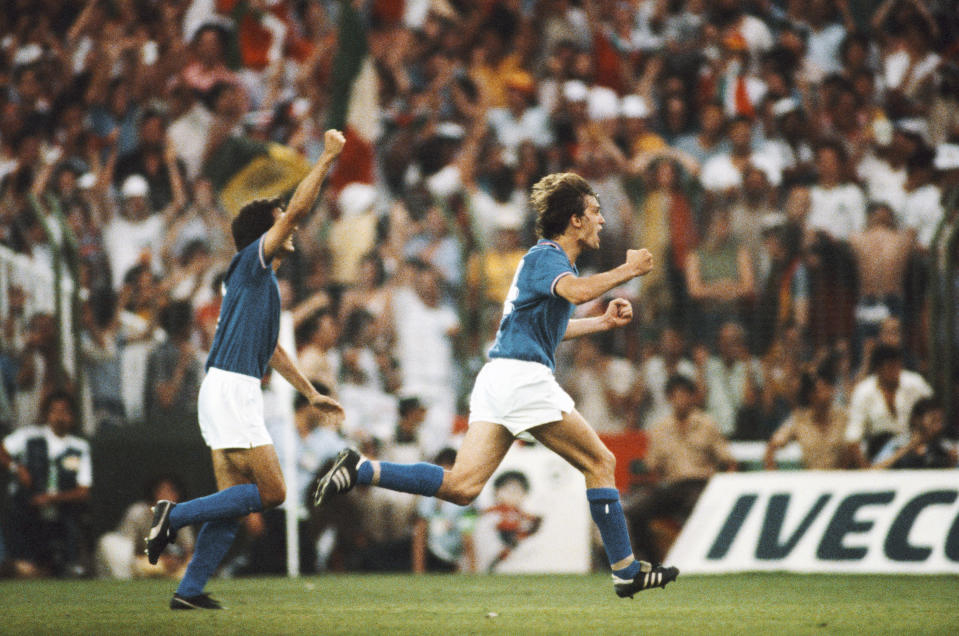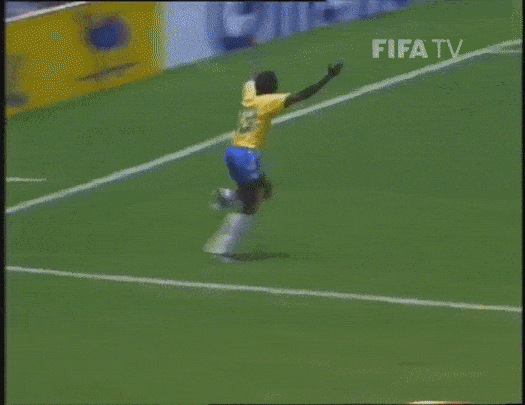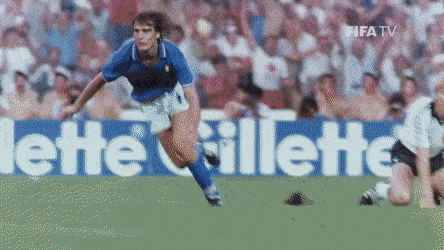Iconic World Cup Moments: Marco Tardelli's goal celebration, 1982

The slow, steady evolution of the goal celebration matches the trajectory of football’s TV coverage towards saturation point. Where moustachioed, late 19th-century inside forwards once considered a cursory handshake to be the extent of congratulation, you now see inverted wingers clearing themselves some space by the corner flag to perform a brief dance routine from Fortnite. The guidance – and quite right, too – is essentially this: celebrate like everyone’s watching.
Goal celebrations – much like the goals themselves – should be judged on their context as well as their execution. Whoever first decided to run towards the corner (why the corner? And why do even Sunday League players run there, where not even the single fan and his dog are stood?) and do a little jump, while pumping a single fist at the same time, is responsible for the most common, sliced-white-bread technique of all, one suitable for anything from breaking the deadlock to equalising just before half time to icing the cake of a 5-0 victory in the 89th minute.

World Cups, though – the nominal, if not actual, pinnacle of association football – tend to unleash something rather less restrained in the goalscorer. Domestic and European seasons might feel like they all blend into one after a while, but the World Cup remains (mercifully, despite some regular FIFA tinkering) a quadrennial experience for the watching majority, and a once-or-twice-in-a-lifetime opportunity for the precious playing few.
READ MORE: World Cup fixtures and TV schedule
READ MORE: 5 of the most lethal groups of death
READ MORE: World Cup 2018 – The team by team guide
READ MORE: World Cup 2018 – England draw ‘favourable’ group after dodging giants
Marco Tardelli claims not to remember anything about his defining moment, which arrived in a final that few Italian observers had hopes of them reaching.
“It was strange – the press didn’t want me in the squad to begin with,” he recalled in 2012. “They said I’d had a tough and long season and I hadn’t been playing too well leading up to the tournament.”
With Italian football still reeling from the Totonero betting scandal of 1980 – the judgements from which had nearly cost Paolo Rossi his own place in World Cup history – their 1982 World Cup campaign got off to a thoroughly inauspicious start. Draws against Poland, Peru and Cameroon were not the ominous signs of champions-in-waiting, while Brazil and England sailed through the first group stage with three wins from three and West Germany – even after an upset against Algeria – remained immune from self-doubt.
The second round placed 12 teams into four groups of three, with Italy – who had scraped through by a single goal ahead of Cameroon – finding themselves in not just with Diego Maradona’s Argentina but also Brazil ‘82 (one of the few World Cup teams who can justify having the abbreviated year next to their name). Claudio Gentile’s chaperoning of Maradona ensured a win over the former, before Paolo Rossi’s hat-trick sunk the romantic latter.
Two more Rossi goals dealt with Poland again in the semi-final at the Nou Camp. The same day, the Germans came through a marathon – and what would have been a passable final in its own right – on penalties against France in Seville.
“I could never sleep before games, not due to nerves but because I just never felt tired”, said Tardelli. “I would spend hours awake just talking with [manager Enzo] Bearzot.”
Rossi aside – and he had arguably already secured his World Cup legacy anyway – the under-fire Tardelli embodied better than anyone the sheer release of that evening in Madrid.
Rossi opened the scoring just before the hour mark with his sixth of the tournament. 12 minutes later, with Germany preparing to throw die Küchenspüle at the Italian defence, sweeper Gaetano Scirea burst out on the counter-attack, which soon turned into a patient penalty area probe. He swapped passes with Guiseppe Bergomi before spotting Tardelli on the edge of the penalty area.
One heavy touch to take it out of his feet. Bernd Förster, one of the few German defenders whose socks hadn’t been rolled down knackered legs, lunged in to block. Tardelli almost fell into his left-foot shot from 18 yards…and the ball flew past Toni Schumacher.
That passage of play is worth revisiting in detail, simply because it is one of the few World Cup final goals that is less famous than the celebration which followed it.
After I scored, my whole life passed before me, the same feeling they say you have when you are about to die…

…the joy of scoring in a World Cup final was immense, something I dreamt about as a kid, and my celebration was a release after realising that dream. I was born with that scream inside me. That was just the moment it came out.
There is a reason why that arcing run, that shaking head (not shaking with dismissal, or disbelief, just through sheer emotion), those clenched fists, those pumping arms and that clearly lip-readable scream of “GOL! GOOOL! GOOOOOOOL” is so – and I hesitate to summon an already exhausted word – iconic.
The best goal celebrations are supposed to be life-affirming – the ultimate act of tapping into a football fan’s perception of what it must be like to be down there on the pitch, doing that – but, on a visual level, is something else entirely. In glorious isolation, this is as satisfying to watch as any goal ever scored and then captured on loop forever, as perfect as any slow-motion, over-the-shoulder, top-corner volley.
The original TV broadcast angle shows Tardelli bending a run from the 18-yard line towards his exultant bench, and then continuing down the touchline as jobsworth Spanish police in khaki shirts and lopsided berets try and stop the rest of the Italian squad joining him on the journey. FIFA’s official film, shot from that touchline, takes away any clue of where Tardelli is running, leaving you to focus purely on that manic expression of joy, of relief, of vindication, of having scored in a World Cup final. The camera tracks him all the way until he becomes a sweaty blue blur.
“If you’re looking at football as a vehicle of human emotion and endeavour,” James Richardson once said of this moment, “it’s the money shot”.

 Yahoo Sport
Yahoo Sport 





































